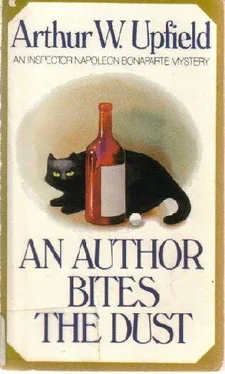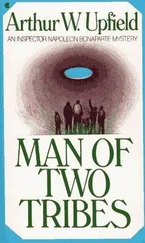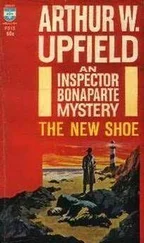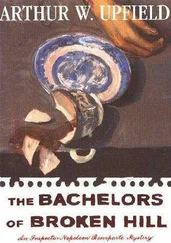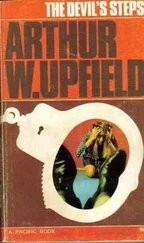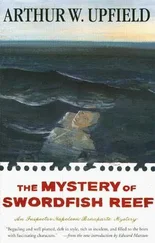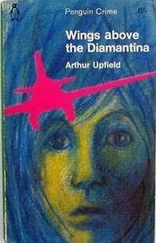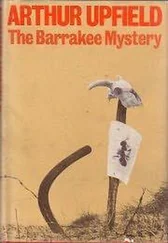Arthur Upfield - An Author Bites the Dust
Здесь есть возможность читать онлайн «Arthur Upfield - An Author Bites the Dust» весь текст электронной книги совершенно бесплатно (целиком полную версию без сокращений). В некоторых случаях можно слушать аудио, скачать через торрент в формате fb2 и присутствует краткое содержание. Жанр: Классический детектив, на английском языке. Описание произведения, (предисловие) а так же отзывы посетителей доступны на портале библиотеки ЛибКат.
- Название:An Author Bites the Dust
- Автор:
- Жанр:
- Год:неизвестен
- ISBN:нет данных
- Рейтинг книги:5 / 5. Голосов: 1
-
Избранное:Добавить в избранное
- Отзывы:
-
Ваша оценка:
- 100
- 1
- 2
- 3
- 4
- 5
An Author Bites the Dust: краткое содержание, описание и аннотация
Предлагаем к чтению аннотацию, описание, краткое содержание или предисловие (зависит от того, что написал сам автор книги «An Author Bites the Dust»). Если вы не нашли необходимую информацию о книге — напишите в комментариях, мы постараемся отыскать её.
An Author Bites the Dust — читать онлайн бесплатно полную книгу (весь текст) целиком
Ниже представлен текст книги, разбитый по страницам. Система сохранения места последней прочитанной страницы, позволяет с удобством читать онлайн бесплатно книгу «An Author Bites the Dust», без необходимости каждый раз заново искать на чём Вы остановились. Поставьте закладку, и сможете в любой момент перейти на страницу, на которой закончили чтение.
Интервал:
Закладка:
“Try one of these,” he urged, his eyes twinkling. “They are supplied to me by my pet black marketeer. I understand that he obtains them from Parliament House. Naturally they are very good.”
“What lovely fat ones!” Miss Pinkney cooed, and Bony held a match in service. He continued to press his questions, having no particular object in mind.
“It didn’t occur to me that the strength of ping-pong balls varied so much,” he said. “Where did theBlakes purchase their balls, I wonder, when it was so hard to procure them in Australia?”
“I don’t know, Mr Bonaparte. I think the Spanish gentleman brought some with him. I know he brought his own bats because I saw and heard him speaking about them. Such a funny little man. My! This is a lovely cigarette.”
They went on to talk of the unwarranted shortage of tobacco, and to laugh good-humouredly at the naive excuses put over by statesmen who seem to think their victims have no intelligence. Miss Pinkney became a vocal butterfly flying from one flower-subject to another, and for an hour Bony listened and enjoyed it.
On rising from the table, he begged to be excused to write letters. In his cool and quiet bedroom, he took from his suitcase the crushed ping-pong ball and held it close to the table lamp. There was no ink-spot on it, no evidence to his sharp eyes that there had ever been one. There was neither maker’s name nor mark.
Chapter Sixteen
Checkmated
DURING the night it rained heavily, and when Bony left the house to saunter in Miss Pinkney’s garden after breakfast, he was welcomed by a revivified world. The wind coming from the south was cool and tempering to the sun. The birds were active and happy. AndD. I. Napoleon Bonaparte was thoroughly enjoying his holiday.
Admiring Miss Pinkney’s flowers and shrubs and vegetables, he arrived eventually at the far end of the garden where he had sat to read novels in the shadow provided by the lilac-trees. Beyond them, and obviously in the next garden, a woman was talking and a man was making short comments. Bony could not resist taking a peep over the fence.
Standing on the middle of the lawn, Mrs Blake was giving orders to Walsh, the casual gardener. He could not hear what she was saying, but she was pointing to various sections of the garden, and Walsh was nodding either in assent or understanding. Then, when he attempted to argue, she silenced him with a command of her hand, and spoke sharply and loudly enough to reach Bony.
“That will do, Walsh. I will not be dictated to,” she said, and left the man to gaze after her with the ghost of a leer on his dissipated face.
The newspapers arrived by bus at half past nine, and shortly afterwards Bony called at the shop to buy theRecorder, in which should be Nancy Chesterfield’s promised paragraph.
Having purchased a copy of the paper, he stood on the footpath to search for the paragraph, eventually finding it and reading:
Who should call on me today but an old friend who bears the distinguished name of NapoleonBonaparte. Mr Bonaparte is an author and journalist of Johannesburg, South Africa, and he is visiting Australia to strengthen his impressions of us and further his knowledge of our literature. The last occasion I met Mr Bonaparte was before the war at a little Queensland village called Banyo, a few miles from Brisbane, and I recall the many stories he had to tell of Queensland, where he seems more at home than we do in Melbourne. I hope to meet him again before he leaves Victoria for Queensland which is, I think, to be his next porto’call.
Bonaparte raised his head and broke into delighted laughter.
“Morning! Happy about something?”
He turned to meet the inquiring eyes of Constable Simes.
“Very,” he admitted. “It’s a great day after the rain.”
“Do the gardens a lot of good,” Simes asserted. “I have a message for you. Er -Mrs Farn presents her compliments to Mr Bonaparte, of South Africa, and desires to invite the said Bona-sorry, invite Mr Bonaparte to supper this evening in order to meet Miss Ethel Lacy, one time maid to Mrs Mervyn Blake.”
“The said Bonaparte-no, sorry, Mr Bonaparte presents his compliments to Mrs Farn. He will be delighted to accept her very kind invitation-say about eight o’clock.”
“You made a note about who owned theBlakes ’ house,” Simes said. “I found out that Mrs Blake purchased the property two years ago for cash. Paid?2,250 for it.”
“Indeed! She must be in the money. Well, I mustn’t linger, Simes. See you later.”
With the folded newspaper under an arm and his hands clasped behind him, Bony paused before a bed of Miss Pinkney’s gladioli, seeing in the depths of their colours the face of Nancy Chesterfield. She had caught him out, and now he was interested by his own reactions, finding that he was not mortified but amused. A man less balanced might have felt horribly annoyed, especially a man as vain as Napoleon Bonaparte. It was his sense of humour that saved him on this occasion from temporarily abnormal blood-pressure, as so many times in his life it had helped to maintain that imperturbable suavity.
He had made, and admitted, the common error of underestimation. He had found what seemed to be a small clique hedging about the death of one of its members, and he had found a possible means of inserting himself into that clique. With all the confidence in the world, he had begun to go for his objective through Nancy Chesterfield, and he had failed by not giving due weight to her intelligence. He had talked to her in her office on the basis of his estimate of her formulated when observing her on the terrace of the Rialto Hotel, whereas, immediately he saw the appointments of her office he should have revised that estimate. A woman occupying such an office must be an important member of the newspaper staff, a position to which no one rises without intelligence far above the average.
The lesson was salutary, and he enjoyed it. He carried the chair from the veranda to the shade of the lilac-trees, and there reread the paragraph three times. Thereafter he lounged deep into the chair, his hands behind his head, unaware that Mr Pickwick was pouncing upon the paper sheets being stirred by the wind.
He thought he had captured the spirit of the paragraph writer when she was composing the item for publication. Through some channel or other, she had ascertained what he was. She was not angered by the deception he had practised, but could not refrain from punishing him for it. Had she been angry, she would have published his profession and probable interest in the Blake case, but she was content to slap him with the reference to his stories of Queensland. She wanted him to know that she knew he was a liar, and had then expressed the hope that they would meet again before he left the State. Why? To have the opportunity of slapping him again? The paragraph did not give him that impression.
Hang it! He had blamed Clarence B. Bagshott for exaggerating, and he had sinned as badly.
Slightly vexed with himself, he took upThe Literature of the Western Pacific Peoples by Dr Dario Chaparral. The copy in his hands had been issued by a London publishing house, and it contained a portrait of the author. Without doubt, he was Miss Pinkney’s “Spanish gentleman”.
Dr Chaparral had devoted some sixty pages of his book to the history of Australian literature. He wrote lucidly and it was apparent that he treated his subject with respectful earnestness. When he came to his review of the works of the moderns, Bony noted the names, and finally totalled seven. Mervyn Blake’s work was given priority in importance. In receding order were the names of Wilcannia-Smythe, Ella Montrose, and Twyford Arundal. Janet Blake was acclaimed as Australia’s most noted short-story writer, and the remaining two were beyond his knowledge.
Читать дальшеИнтервал:
Закладка:
Похожие книги на «An Author Bites the Dust»
Представляем Вашему вниманию похожие книги на «An Author Bites the Dust» списком для выбора. Мы отобрали схожую по названию и смыслу литературу в надежде предоставить читателям больше вариантов отыскать новые, интересные, ещё непрочитанные произведения.
Обсуждение, отзывы о книге «An Author Bites the Dust» и просто собственные мнения читателей. Оставьте ваши комментарии, напишите, что Вы думаете о произведении, его смысле или главных героях. Укажите что конкретно понравилось, а что нет, и почему Вы так считаете.
